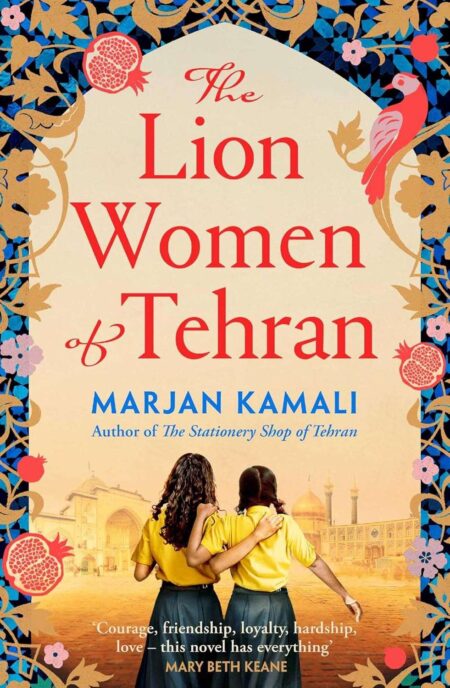Description
**Book: *The Lion Women of Tehran* by Marjan Kamali**
*The Lion Women of Tehran* by **Marjan Kamali** is a captivating, poignant, and richly layered novel that weaves together themes of family, identity, resilience, and the complex relationship between tradition and modernity. Set against the backdrop of 1970s Iran, the story follows the lives of three generations of women in one Iranian family, who navigate personal transformation, political upheaval, and cultural shifts with courage and strength. Kamali’s writing beautifully blends the personal and the political, exploring how the lives of women are shaped by both external forces and their own inner struggles.
The title of the novel references the metaphor of “lion women”—strong, independent, and brave women who challenge expectations and forge their own paths in the face of adversity. Kamali’s storytelling is both intimate and expansive, drawing readers into the richly textured world of Tehran, as well as into the lives of women determined to chart their own courses, despite the challenges they face.
—
### **Overview**
At the heart of *The Lion Women of Tehran* is the story of **the Keshvarian family**, whose women are united by a legacy of strength, defiance, and resilience. Each of the women in the family faces her own set of challenges, from navigating the strictures of society to confronting the expectations placed on them by their families and by the larger political and social forces of their time.
The novel primarily focuses on **Shirin**, a young woman who dreams of becoming a revolutionary artist during a time of political unrest in Iran. She is the daughter of a woman who has spent her life upholding tradition and maintaining the family’s honor in a time of significant cultural change. As Shirin navigates her dreams of artistic freedom, she comes into conflict with her mother’s more conservative expectations, forcing her to confront the role she is expected to play in both her family and society at large.
As Shirin grows, the novel shifts focus to her grandmother, **Laleh**, who has her own past of rebellion, and her daughter, **Tara**, who represents a new generation with her own set of dreams, fears, and challenges. Through the lens of these three generations of women, the novel explores how their lives and choices are shaped by their country’s shifting political landscape—from the Pahlavi dynasty to the 1979 Islamic Revolution—and how each woman finds her own path to independence, defiance, and identity.
—
### **Key Themes and Concepts**
1. **Generational Conflict and Continuity**: One of the central themes of *The Lion Women of Tehran* is the tension between tradition and change, and how this plays out across generations. The different desires and ambitions of Shirin, Tara, and Laleh show how women’s roles and identities evolve, even as they are bound by family expectations. The novel beautifully captures the generational dynamics and how each generation must navigate both the legacy of the past and the changing world around them.
2. **The Power of Female Bonding**: At its heart, *The Lion Women of Tehran* is a story about the bond between women—mothers and daughters, grandmothers and granddaughters—across time. Despite their differences, the women of the Keshvarian family share a deep connection that transcends personal conflict. Their love for each other forms the emotional core of the novel, with each woman influencing the others in profound ways.
3. **Cultural Identity and the Weight of Tradition**: Shirin’s story touches on the delicate balance between honoring one’s cultural heritage and forging a personal identity. The novel explores the pressures placed on women to conform to societal norms, particularly in Iran, where women have historically faced strict limitations on their personal freedom. The story grapples with questions of cultural identity, tradition, and the ongoing struggle for self-expression.
4. **Political and Social Upheaval**: The novel is also deeply informed by the political climate of 1970s Iran, leading up to the Islamic Revolution of 1979. This period was marked by significant upheaval, with growing discontent over the regime of Shah Mohammad Reza Pahlavi, which ultimately led to the fall of the monarchy. Kamali captures the changing political landscape and how these shifts affect the lives of ordinary people, particularly women. The tension between modernity and conservatism, freedom and oppression, is a key backdrop to the characters’ personal stories.
5. **Love, Sacrifice, and Resistance**: Each of the women in the novel is faced with moments of personal sacrifice and resistance. Whether it is Shirin’s struggle to pursue her artistic dreams, Tara’s challenge of creating a new life in the face of political upheaval, or Laleh’s own acts of defiance in her younger years, the novel examines how love, resilience, and resistance shape their choices and their futures.
—
### **Why You Should Read *The Lion Women of Tehran* by Marjan Kamali**
1. **A Rich, Complex Story**: *The Lion Women of Tehran* is an evocative, multilayered story that combines family drama, historical fiction, and cultural exploration. Kamali’s nuanced portrayal of Iran’s political and social landscape adds depth to the narrative, making it not just a story of individual lives, but a reflection of an entire society in flux.
2. **Strong Female Characters**: The novel features powerful female characters who are navigating the complexities of their lives in the face of societal expectations. Each woman in the Keshvarian family is given a voice, and Kamali does an exceptional job of depicting their inner lives, struggles, and triumphs. The portrayal of female resilience and strength is at the heart of the novel.
3. **Exploration of Cultural and Political Change**: If you’re interested in history and politics, this book offers an insightful look at the changes in Iranian society, particularly from the perspective of women. The story is set against the backdrop of a pivotal time in Iran’s history, and Kamali’s careful attention to detail paints a vivid picture of the political and cultural challenges that accompanied the revolution.
4. **A Story About Family and Legacy**: The novel explores how family relationships evolve over time, particularly between mothers and daughters. It also reflects how legacies are passed down through generations, and how the choices made by one generation impact the next. This aspect of the book makes it both a personal and universal story.
5. **Emotional and Thought-Provoking**: *The Lion Women of Tehran* is an emotional, thought-provoking read that delves deeply into themes of identity, freedom, and sacrifice. The novel’s exploration of the complexities of being a woman in a patriarchal society, along with its richly drawn characters and their personal journeys, will resonate with readers on many levels.
—
### **Conclusion**
*The Lion Women of Tehran* by **Marjan Kamali** is a beautifully written, emotionally resonant novel that deftly captures the experiences of three generations of women navigating the shifting sands of Iranian society during a time of profound political and cultural change. Through the lives of Shirin, Tara, and Laleh, Kamali crafts a story about strength, identity, resistance, and the enduring bonds of family. With its rich cultural context, compelling characters, and thought-provoking themes, this novel is a must-read for anyone interested in stories about family, identity, and resilience, especially within the complex backdrop of a rapidly changing society.
Whether you’re drawn to historical fiction, stories of strong women, or exploring the intersection of politics and personal identity, *The Lion Women of Tehran* offers a compelling and richly layered narrative that will stay with you long after you turn the final page.












Reviews
There are no reviews yet.